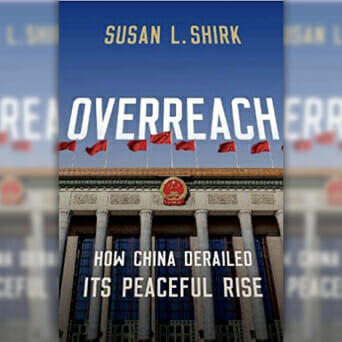Overreach: How China Derailed its Peaceful Rise
Susan Shirk, Research Professor and Chair of the 21st Century China Center at the University of California San Diego; former Deputy Assistant Secretary of State in the Bureau of East Asia and Pacific Affairs
November 16, 2022 | 12:15 PM-1:30 PM
SRH 3.122, LBJ School
On Wednesday, November 16, the Asia Policy Program, with the Center for East Asian Studies, is hosting Susan Shirk, Research Professor and Chair of the 21st Century China Center at the University of California San Diego and former Deputy Assistant Secretary of State in the Bureau of East Asia and Pacific Affairs, to discuss her upcoming release, Overreach: How China Derailed its Peaceful Rise, at 12:15 PM at SRH 3.122, LBJ School. This talk will be moderated by Dr. Sheena Chestnut Greitens, director of the Asia Policy Program and Associate Professor at the LBJ School of Public Affairs. The Asia Policy Program is a joint effort of the Clements Center for National Security and the Strauss Center for International Security and Law.
For decades, China’s rise to power was characterized by its reassurance that this rise would be peaceful. After Mao’s death in 1976, China’s leaders adopted a restrained approach to foreign policy. They determined that any threat to their power, and that of the Chinese Communist Party, came not from abroad but from within–a conclusion cemented by the 1989 Tiananmen crisis. To facilitate the country’s inexorable economic ascendence, and to prevent a backlash, they reassured the outside world of China’s peaceful intentions.
Then, as Susan L. Shirk shows in this illuminating, sobering, and utterly persuasive new book, something changed. China went from fragile superpower to global heavyweight, threatening Taiwan as well as its neighbors in the South China Sea, tightening its grip on Hong Kong, and openly challenging the United States for preeminence not just economically and technologically but militarily. China began to overreach. Combining her decades of research and experience, Shirk, one of the world’s most respected experts on Chinese politics, argues that we are now fully embroiled in a new cold war.
To explain what happened, Shirk pries open the “black box” of China’s political system and looks at what derailed its peaceful rise. As she shows, the shift toward confrontation began in the mid-2000s under the mild-mannered Hu Jintao, first among equals in a collective leadership. As China’s economy boomed, especially after the Global Financial Crisis of 2008, Hu and the other leaders lost restraint, abetting aggression toward the outside world and unchecked domestic social control. When Xi Jinping took power in 2012, he capitalized on widespread official corruption and open splits in the leadership to make the case for more concentrated power at the top. In the decade following, and to the eve of the 20th CCP Congress when he intends to claim a third term, Xi has accumulated greater power than any leader since Mao. Those who implement Xi’s directives compete to outdo one another in fervor, provoking an even greater global backlash and stoking xenophobia within China on a scale not seen since the Cultural Revolution.
Here is a devastatingly lucid portrait of China today. Shirk’s extensive interviews and meticulous analysis reveal the dynamics driving overreach. To counter it, she argues, the worst mistake the rest of the world, and the United States in particular, can make is to overreact. Understanding the domestic roots of China’s actions will enable us to avoid the mistakes that could lead to war.
BIOGRAPHY
Susan Shirk is a research professor and chair of the 21st Century China Center. She is one of the most influential experts working on U.S.-China relations and Chinese politics. She is also director emeritus of the University of California’s Institute on Global Conflict and Cooperation (IGCC).
Susan Shirk first visited China in 1971 and has been teaching, researching and engaging China diplomatically ever since. From 1997-2000, Dr. Shirk served as Deputy Assistant Secretary of State in the Bureau of East Asia and Pacific Affairs, with responsibility for China, Taiwan, Hong Kong and Mongolia.
Shirk’s book China: Fragile Superpower helped frame the policy debate on China in the U.S. and other countries. Her other publications include The Political Logic of Economic Reform in China; How China Opened its Door; Competitive Comrades: Career Incentives and Student Strategies in China; and her edited book, Changing Media, Changing China. Her current book project is Overreach: How China’s Domestic Politics Derailed its Peaceful Rise. Her articles have appeared in leading academic publications in the fields of political science, international relations and China studies, and her views on a range of issues relating to modern Chinese politics are highly sought.
Shirk co-chairs a task force of China experts that issued its second report “Course Correction: Toward an Effective and Sustainable China Policy,” in February 2019. She is also co-chair of the UC San Diego Forum on U.S.-China Relations, the first ongoing high-level forum focused entirely on the U.S.-China relationship.



